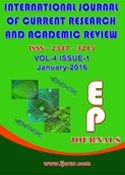Abstract Volume:4 Issue-1 Year-2016 Original Research Articles
 |
Online ISSN : 2347 - 3215 Issues : 12 per year Publisher : Excellent Publishers Email : editorijcret@gmail.com |
2Radiation Oncologist, Tabriz University of Medical Sciences, Tabriz, Iran 3Ondokuz Mayis University, Faculty of Medicine, Samsun, Turkey
Urticaria was a skin lesions of varying size that are characterized with erythematous plaque with regular or irregular margins in the red, sometimes with a red pressure go away. The aim of this study was evaluation the effects of Levothyroxine on patients with chronic pruritus and anti-TPO+. In a clinical trial study that performed in department of endocrinology and metabolism of Tabriz University of Medical Sciences on patients with chronic pruritus, the effects of Levothyroxine on patients with chronic pruritus and anti-TPO+ evaluated. Mean age of case groups patients was 32.30±9.99 year and mean age of control groups patients was 36.83±11.92 (P=0.085). Two patients of case group and 3 patients of control group were male and 34 patients of case group and 33 patients of control group were female(P=0.500). Before of study; in case group, 12 of patients had mild pruritus, 18 of them had moderate pruritus and 6 of them had severe pruritus. In control group, 6 of patients had mild pruritus, 22 of them had moderate pruritus, 7 of them had severe pruritus and one of them had very sever pruritus. Significant difference was not found between pre-study pruritus severity of patients and two groups was matched in pre-study pruritus severity (P=0.142). At the end of study; in case group, 20 of patients had mild pruritus, 6 of them had moderate pruritus and 10 of tham had no pruritus. In control group, 16 of patients had mild pruritus, 11 of them had moderate pruritus and 9 of them had no pruritus. Significant difference was not found between post-study pruritus severity of patients of two groups (P=0.327). Mean TSH level of case group patients was 5.86±7.23 and mean TSH level of control group patients was 4.23±2.41 (P=0.210). Mean anti-TPO level of case group patients was 816.67±681.79 and mean anti-TPO level of control group patients was 920.43±1953.32(P=0.764). In patients of case and control groups, pruritus severity was significantly decrease at post-study than pre-study and results indicate that, both treatment was effective in decrease of pruritus severity of patient, but, treatment with Levothyroxine was more effects due to routine treatment.
How to cite this article:
Farzad Najafipour, Mahnaz Sadeghi Shabestari, Behnam Nasiri Motlagh, Mostafa Najafipour, Behzad Nazari and Mohammad Khanmohammadi. 2016. Evaluation the Effects of Levothy Roxine on Patients with Chronic Pruritus and Anti-TPO+.Int.J.Curr.Res.Aca.Rev. 4(1): 192-201doi: http://dx.doi.org/10.20546/ijcrar.2016.401.019



Quick Navigation
- Print Article
- Full Text PDF
- How to Cite this Article
- on Google
- on Google Scholor
- Citation Alert By Google Scholar
